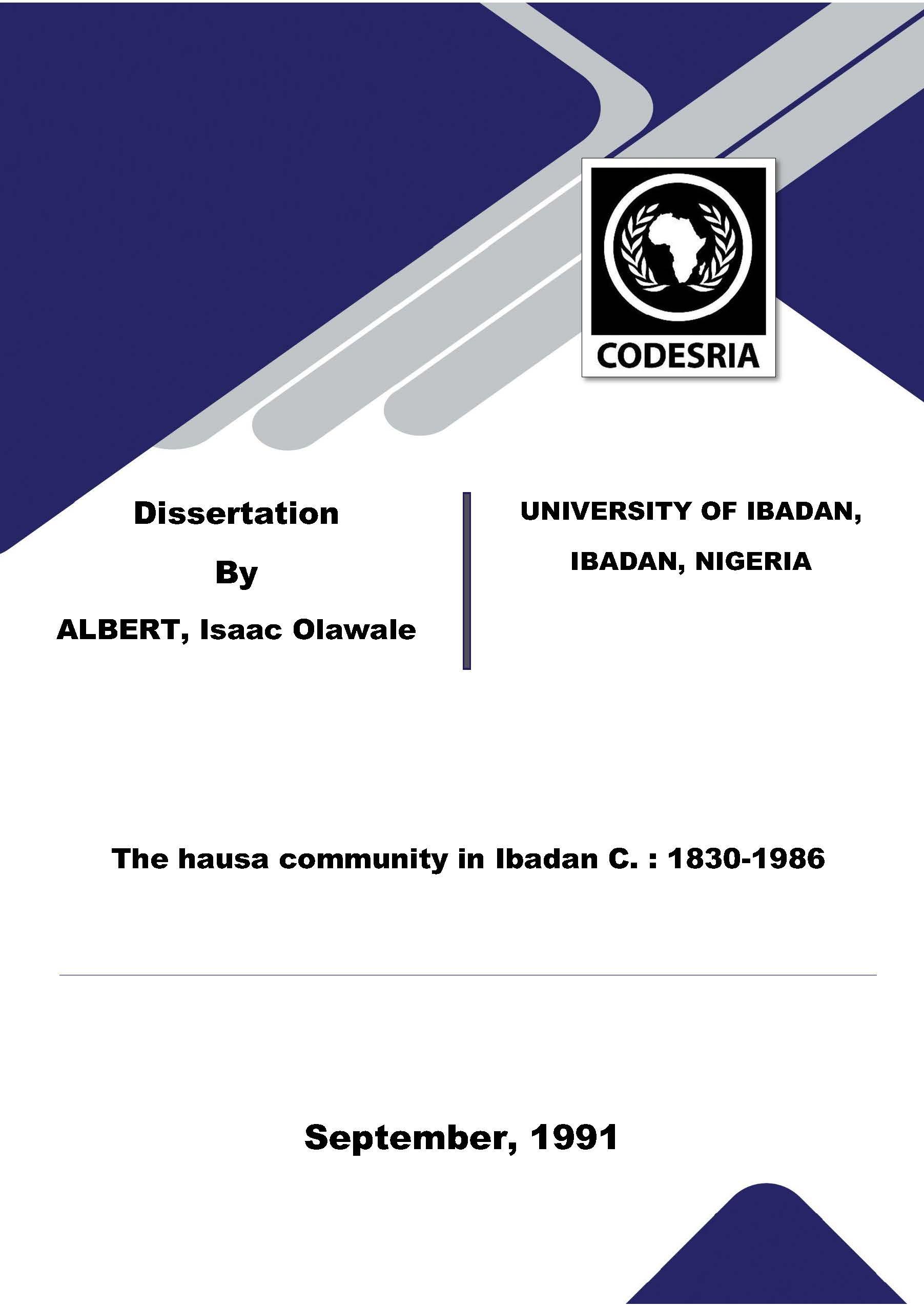THE HAUSA COMMUNITY IN IBADAN C. 1830-1986,
Mots-clés :
Ethnic groups,, economic conditions, social participation, women, migration, social problems, religious practice, politics, Hausa, Ibadan, NigeriaSynopsis
There are two _categories of Hausa communities: those within Hausaland and those outside it. While much has been published on. the Hausa people in their traditional homeland, only little is known about those in the diaspora. This work 1s concentrated on the Hausa emigrants outside the traditional Hausaland, specifically in the Yoruba country southwest of Hausaland. The focus of study is· lbadan, the largest Yoruba settlement. Oral and documentary material have been used in the study~ These have shown that the presence of the Hausa people in I badan can be dated to the early nineteenth century when the city itself
was fourded. The immigrants have exploited their exclusive ethnic flexibility .and cultural unity woven around· the Islamic religion to impose upon some parts of lbadan a migrant culture. They have a major quarter at Sabongari (Sabo),. a livestock market ( Kara) at Bodija, kolanut depot at Oja'ba and a pepper /onions market .at Sasa. This study which readily complements· others done on the city of lbadan and on Hausa migration, seeks to examine how the Hausa emigrants came to the city of lbadan, how they were received into it, their initial problems and challenges, how these were surmounted and how Sabo and the other Hausa settlements and markets in lbadan were established.
Téléchargements
Références
Alhaji Makama Ahmadu Bature, the ex-Sarkin Hausawa lbadan
(1944-1948). 62 years old. Interviewed Dec. 16, 1990.
Alhaji Shaibu Dikko, the current Sarkin Hausawa lbadan.
years old. Interviewed 13th and 15th Dec. 1990.
Alhaji Hassan lsiaka Omo-Oba, a prominent cattle trader at
Bodija Livestock Market, c. 36 years, interviewed Dec. 7 1990
and Dec. 16 1990.
Alhaji Ahmed Zungeru, the Wakili of Sabo, lbadan c. 42 years.
Oral contribution to the Institute of African Studies/UNESCO
Seminar on the 'Stages of Life', 23-24 Oct. 1990.
·,
Alhaji Dan Dauda, member of the Hausa community at Sabo.
c. 60 years. Oral contribution to the Institute of_ African
Studies/UNESCO Seminar on 'Stages of Life', 23-26 Oct. 1990.
Alhaji Audu Zarro, member of the Hausa community at Sabo.
c. 55 years. Oral contribution to the Institute of Africa
Studies/UNESCO Seminar. Interviewed 26th Oct. 1990 and 2nd
Nov. 1990.
Hajia Awa Muhammed, female member of the Hausa community.
Oral contribution to the Institute of African Studies/UNESCO
Seminar on 'Stages of Life'.
Ma llama Aishatu Mai Angwa, female member of the Hausa
community. c. 24 years. Oral contribution to the Institute of
African Studies/UNESCO Seminar on 'Stages of Life',
Interviewed on 24th and 26th' Oct. 1990.
Alhaji K. B. Yusuf, Secretary-General of the Bodija Traders
Association (BTA) and a cattle trader. c. 50 years old.
Interviewed 14th feb. 1991 Alhaji Dina, the Coordinating Chairman of BT A. c. 58 years.
Interviewed 14th Feb. 1991.
Chief Francis Olaniyan, Bale Onimalu of lbadan and a cattle
trader. c. 70 years. old: Interviewed 19th Jan. 1991.
Chief (Alhaja) Niuniratu Adenihun, lyaloja Onimalu, Bodija
Cattle Market. c;. 65 years. Interviewed 19th Jan. 1991.
Rev. J.B. Magaji, the Pastor, Bishara Baptist Church, Sabo,
lbadan. c. 45 years. Interviewed 10th Feb. 1991.






